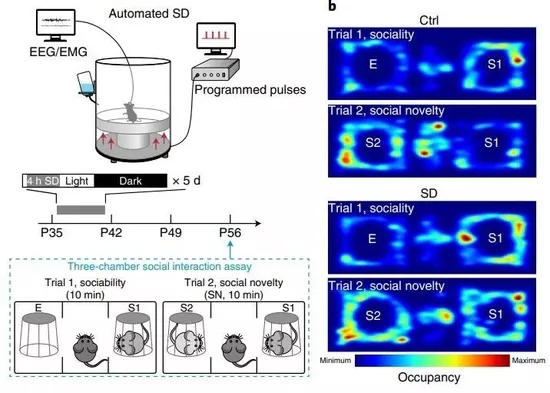Sleep takes up almost a third of your life. It is conceivable that adequate sleep must be of great significance to life. Lack of sleep, sometimes will soon show problems, such as headache, fatigue, unable to concentrate. If a long-term lack of sleep, many physiological indicators will also turn red, which is closely related to the increased risk of a series of diseases such as obesity, dementia and cancer.
However, lack of sleep may have some less obvious effects, but it can quietly affect life after many years. You may not think that the social disorder in adulthood may also be the hidden danger of insufficient sleep in adolescence.
Recently, a research paper published in Nature Neuroscience revealed through mouse experiments that sleep disturbance in adolescence will directly affect the social behavior of adults, and social defects will occur when interacting with unfamiliar mice. On the contrary, if we can try to supplement sleep in adolescence, it can help autistic mice significantly improve their social disorder in adulthood.

How long a person needs to sleep every day shows a significant change with age: in the infant period, more than half of the time every day is sleeping; With the continuous growth and development, our need for sleep continues to decrease until we enter adulthood. The length of sleep is usually stable at 7-8 hours a day.
"Little is known about the role of sleep in development, compared to what it does in adults." "Especially in adolescence development, sleep may play a special role," said Dr. Bian Wenjie of Stanford University, the lead author of the study
In order to answer how sleep in adolescence affects brain function, researchers designed a set of experiments. During adolescence (35-42 days after birth), mice were allowed to sleep less for 4 hours a day for 5 consecutive days. As a result, the social behavior of these mice was abnormal compared with the normal sleeping mice in the control group.
Under normal circumstances, young adult mice are just like young people who are new to the social field. They are naturally curious about strange mice. When facing familiar mice and strange mice at the same time, they will also be more interested in strange mice and will actively socialize with them. However, the mice that experienced sleep disturbance in adolescence lost their strong interest in socializing with unfamiliar mice. In researchers' scientific terms, they lose their preference for social novelty.

However, when researchers conducted the same sleep disturbance in older mice (42-49 days after birth), they found that similar preference loss could be caused, but the effect was not obvious. Later, after adulthood, the same degree of sleep deprivation does not cause changes in social behavior.
These results suggest that sleep during adolescence has a special function for later social behavior.
So why is sleep so special in adolescence? After further exploring the changes in the level of neural circuits, the researchers found that dopaminergic neurons in the ventral tegmental area (VTA) of the midbrain played an important role in this process.
Specifically, the dopaminergic neurons of VTA, the nucleus accumbens (NAC) projected by its nerve fibers and the prefrontal cortex (PFC) constitute the midbrain cortex / limbic system channel, which plays an important role in motivation, addiction and reward related behaviors; For social animals, whether human or mouse, social stimulation is generally considered as a "reward", so VTA also regulates social behavior.
Using the cutting-edge fiber photometry technology, combined with the new dopamine fluorescence probe and other methods, researchers recorded the electrical activity response of VTA dopaminergic neurons in the brain of mice during social behavior in real time, and directly monitored the release of dopamine.
The results showed that when the control group first met a strange companion, both the neuronal response of VTA and the dopamine release of NAC had the greatest response; With the increase of familiarity, the neural response decreased gradually; When a new social stimulus, a new strange mouse, appeared, there would be a large response.
However, in the mice lacking sleep in adolescence, this neural response pattern disappeared! Dopamine release from both VTA neurons and NAC no longer responded to new unfamiliar mice. Moreover, the projections from VTA to NAC were abnormally enhanced in the brains of these mice, suggesting that sleep disturbances in adolescence may affect the wiring and accuracy of dopaminergic neurons during development, resulting in the inability of their adult dopaminergic system to respond promptly and effectively to emerging social stimuli.
Subsequent studies have pointed out that VTA dopamine neurons have different states at different stages of sleep. The normal sleep / wake cycle in adolescence helps to maintain the excitability level of VTA neurons within a reasonable range and avoid over excitation during development, thus forming a normal dopaminergic loop system and social behavior.
The study also explored the possibility of increasing sleep during adolescence to improve social behavior disorders in adulthood. "In a variety of neurodevelopmental disorders, such as autism and schizophrenia, the proportion of sleep disorders is as high as 50%~80%, especially in adolescent patients. More studies have found that in patients with autism, there is a significant positive correlation between sleep disorders and the severity of social disorders." The researchers point out.
Using a mouse model of autism caused by a gene mutation, researchers found that increasing non rapid eye movement (NREM) sleep in adolescence through drugs, selectively increasing cortical slow wave components (one of the important features of NREM sleep) through photogenetic means, or inhibiting the electrical activity level of VTA through chemical genetic means can significantly improve the social disorder of these autistic mice, So that they no longer show "social fear" when facing strange companions in adulthood, but show a relatively normal social novelty preference.
Although these results come from mouse experiments, human social behavior is more complex, and the relationship between changes in social behavior and sleep needs more research, these results are enough to make us further aware of the importance of sleep, especially for adolescents whose brain is in the development stage.

"Our results reveal a new function and its loop mechanism of sleep during brain development in adolescence, and expand our understanding of sleep and social behavior." Dr. Bian Wenjie pointed out that, The "It may be particularly important for teenagers who are in the stage of continuous brain and body development, and the gradual finalization of personality and various behavior habits to ensure adequate and high-quality sleep every day. For those teenagers who unfortunately suffer from neurodevelopmental diseases such as autism and schizophrenia, perhaps we can change our thinking and try to improve sleep to alleviate or prevent social disorder symptoms that may worsen in the future, so as to improve Improve their quality of life. "